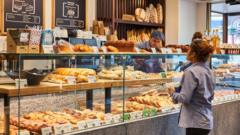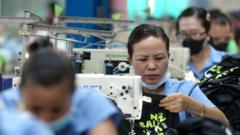In the bustling malls of Singapore, the sweet aroma of fresh baked goods fills the air, drawing queues of customers eager to sample delights from Asian bakeries, including the popular Paris Baguette. Despite its name and Parisian-inspired decor, the bakery is firmly rooted in Korean culture, according to CEO Jin-soo Hur. "Croissants don't need to be limited by their French origin; they're universal," he asserts.
Founded by a family in South Korea 80 years ago, SPC Group, the parent company of Paris Baguette, has transformed into a leader in mass production of baked products, boasting $5.6 billion in sales in the last year. The chain has significantly expanded its presence, now operating over 4,000 outlets in 14 countries, including the U.S. and China. Looking ahead, it plans to open over 1,000 new branches across the globe by 2030, with a major investment in a new production facility in Texas set to support the North American market.
Beyond expansion, Paris Baguette connects with global audiences through partnerships in sports, specifically with clubs like Tottenham Hotspur. "Food is culture, and sports gather people. That's what we aim for in our strategy," Hur explains, referencing the enthusiasm ignited by the company’s products during match days.
While the bakery embraces innovation—reducing labor hours through pre-prepared frozen dough—it also strives to maintain quality. Chef Saveria Busato notes that while mass production may sacrifice artisanal standards, certain items like Korean milk bread are well-received even in Europe for their unique flavors and textured quality.
Despite facing economic challenges, including rising living costs in the U.S., Hur remains committed to cultural influence over mere profit. "We want to redefine global bread culture. Our growth is beneficial both for South Korea and the world." Paris Baguette exemplifies a new generation of bakeries that blend tradition with modern demand, encouraging a broader acceptance of diverse methods and flavors in baking.
Founded by a family in South Korea 80 years ago, SPC Group, the parent company of Paris Baguette, has transformed into a leader in mass production of baked products, boasting $5.6 billion in sales in the last year. The chain has significantly expanded its presence, now operating over 4,000 outlets in 14 countries, including the U.S. and China. Looking ahead, it plans to open over 1,000 new branches across the globe by 2030, with a major investment in a new production facility in Texas set to support the North American market.
Beyond expansion, Paris Baguette connects with global audiences through partnerships in sports, specifically with clubs like Tottenham Hotspur. "Food is culture, and sports gather people. That's what we aim for in our strategy," Hur explains, referencing the enthusiasm ignited by the company’s products during match days.
While the bakery embraces innovation—reducing labor hours through pre-prepared frozen dough—it also strives to maintain quality. Chef Saveria Busato notes that while mass production may sacrifice artisanal standards, certain items like Korean milk bread are well-received even in Europe for their unique flavors and textured quality.
Despite facing economic challenges, including rising living costs in the U.S., Hur remains committed to cultural influence over mere profit. "We want to redefine global bread culture. Our growth is beneficial both for South Korea and the world." Paris Baguette exemplifies a new generation of bakeries that blend tradition with modern demand, encouraging a broader acceptance of diverse methods and flavors in baking.






















